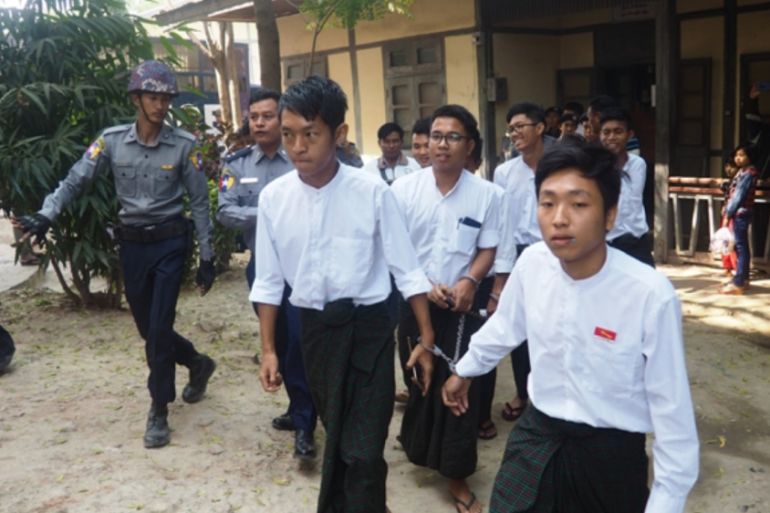Report exposes arbitrary detention, torture of Myanmar activists
Investigation conducted by Fortify Rights and Athan watchdogs alleges torture of detained students by prison guards.

On December 28, 2018, plain-clothes police officers in Myanmar arrested three student leaders, who had protested against the authorities and called for more safety measures on campus, following a series of deaths involving university students in the country’s Mandalay region.
Instead of addressing their concerns, the Yadanabon University students were charged with illegal assembly as well as arson, for setting fire to a makeshift cardboard coffin with photos of government and university officials, during the otherwise peaceful protest.
Keep reading
list of 3 itemsPersecution of critics ‘continues in Aung San Suu Kyi’s Myanmar’
Myanmar charges journalist under terrorism law, blocks news site
In turn, four more students staged a separate rally demanding the release of their colleagues and they were promptly arrested and charged with the same “violations” that had earlier been brought against the three others.
All seven students were found guilty of the charges and sentenced to three months in prison in February 2019. They were released six weeks later, having served the remainder of their detentions.
Earlier, the rector of Yadanabon University had dismissed the students’ concerns over the murder of students in Mandalay saying, “We are all human. Humans can die.”
New report by @FortifyRights & @athan_info documents how #Myanmar authorities arbitrarily arrested & tortured students & prevented students from exercising rights. Govt should release all political prisoners & provide remedies as required under int'l law: https://t.co/ZoHCtqdiRI
— Matthew Smith (@matthewfsmith) April 23, 2020
While in jail, four of the students alleged that they were beaten by prison guards in Obo Prison in Mandalay, according an investigation conducted by Fortify Rights and Athan, two rights groups that monitor human rights violations in Myanmar.
Myint Kyaw, who was among the four detained students, said he was beaten by seven guards using a special stick coiled with a wire.
“We couldn’t sleep on our backs. We had to sleep sideways. That’s how bad it was, how painful it was.”
Ye Lin Aung, another student, explained how he tried to defend himself from the blows.
“I tried to shield my head with my arms, so [the guards] hit my arms and neck. Because I am not very tolerant of pain, after not very long, I stopped moving and fighting back. I was surrounded by three guards. When they were hitting me, I tried to protect my head, but when they pulled me out, they dragged me by my hands. Afterwards, I couldn’t move for a week.”
Systemic issues
The arrests and alleged torture of the students are “emblematic” of what Fortify Rights and Athan said are “broader systemic issues” in Myanmar when it comes to freedom of expression and peaceful assembly.
On Friday, Myanmar President Win Myint announced an amnesty for almost 25,000 people, including 18 political prisoners, citing “humanitarian concerns” as a result of the coronavirus pandemic and the recent New Year celebration of the country.
Amid the annual pardons, however, the Myanmar government continues to arrest, detain, and imprison activists, journalists, and others for exercising their rights, said Fortify Rights and Athan.
|
|
Moreover, the groups said the government has failed to provide political prisoners with “effective remedies” to address their concerns as required by international law.
At least 182 people identified as political prisoners remain behind bars.
“True democracy and freedom for activists in Myanmar is far away since the rights to freedom of assembly and expression are not guaranteed,” said Ye Wai Phyo Aung, one of the co-founders of Athan. “Instead, the civilian government continues to shrink the space for students’ activism.”
The students from Yadanabon University ended up spending more than 80 days in prison.

On their release, the government “failed” to provide an adequate remedy to the students or share the results of an investigation into the beatings by prison guards, Fortify Rights said.
“As the COVID-19 crisis deepens, it’s even more critical that the government free political prisoners and respect fundamental rights,” said Amy Smith, the executive director of Fortify Rights.
“The government should provide remedies to those who have suffered harm, including all those wrongfully deprived of their liberty.”
Although government officials conducted an investigation into the student’s allegations of beatings in prison, at the time of writing, the authorities have not publicly published or provided the students with a report on their findings of the investigation, despite requests by the students.
The government had previously dismissed allegations of rights abuses and promised to investigate allegations of torture by authorities.